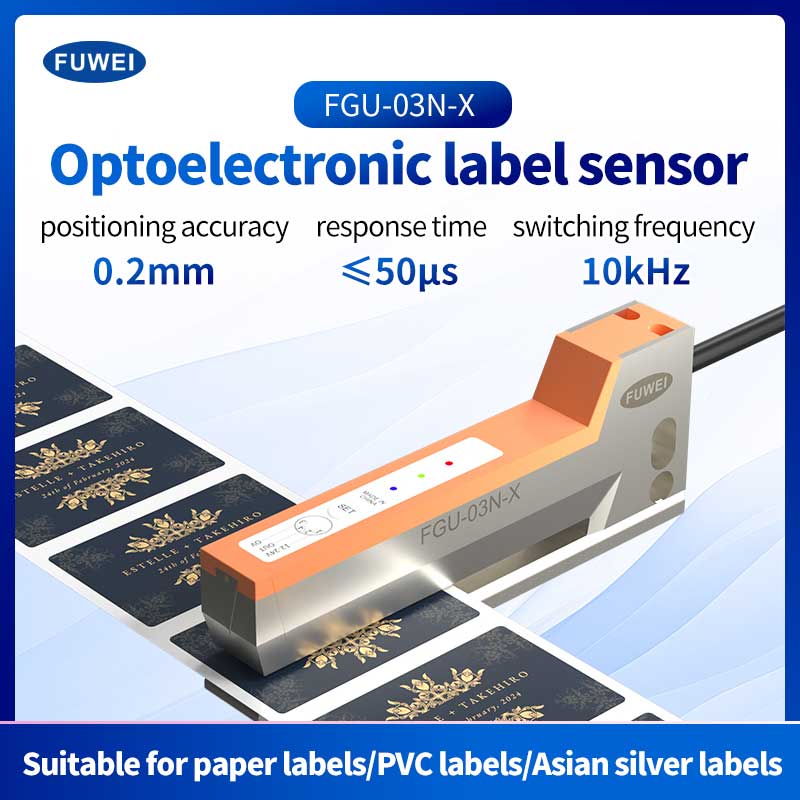What Role Does a Label Sensor Play in Modern Packaging Systems?
2024-12-17
In the fast-paced world of manufacturing and packaging, efficiency and accuracy are paramount. One of the key components that help achieve these goals is the label sensor. While small in size, this device plays a significant role in ensuring that labels are applied correctly and that the entire packaging process remains streamlined.
But what exactly is a label sensor, and why is it so important in today’s packaging industry? In this blog, we will explore the crucial role of label sensors in enhancing the efficiency, precision, and functionality of modern packaging systems.
1. Understanding Label Sensors: What Are They?
A label sensor is a device used to detect and control the positioning of labels on a product or packaging. These sensors typically use technologies like optical sensing, capacitive sensing, or laser detection to detect the presence, alignment, and positioning of labels before they are applied to a product.
In automated labeling machines, these sensors ensure that labels are placed on the correct part of the packaging and that they are oriented properly. By sensing the label’s position, the sensor can trigger the labeling mechanism to apply the label at the right moment, preventing errors in labeling.
2. How Do Label Sensors Improve Accuracy in Labeling?
The main advantage of using a label sensor is the accuracy it brings to the labeling process. Without the right technology, labels could be misapplied, which would lead to wasted materials, incorrect information on products, and potential regulatory issues.
Label sensors are highly accurate in detecting the edge of a label or its presence on the roll, ensuring that each label is aligned correctly on the product. This eliminates the possibility of misalignment, skewed labels, or labels being applied to the wrong area of the packaging. The end result is a consistent, professional look for every product that goes through the labeling system.
3. Boosting Production Efficiency
In fast-paced production lines, speed and efficiency are critical. A label sensor significantly boosts production efficiency by ensuring that labels are applied in real-time without unnecessary delays. The sensor detects the exact position of the label, allowing the labeling machine to work at optimal speeds.
By automating the label application process with sensors, businesses can minimize downtime, reduce human error, and avoid costly mistakes. The sensor ensures that the system runs smoothly, even when processing large volumes of products, which is essential for high-demand manufacturing environments.
4. Reducing Waste and Costs
Label sensors can help reduce material waste by ensuring that labels are applied precisely and without defects. When labeling machines are not properly aligned or do not detect labels correctly, products may get labeled incorrectly, or labels may be wasted by being stuck in the wrong places. This results in a waste of labels, product materials, and labor.
With a sensor in place, the system can detect label faults or misalignments before they become a problem. This prevents errors in the labeling process, leading to cost savings in both materials and labor. For companies that rely heavily on packaging, this translates into significant cost reductions over time.
5. Enhancing Versatility in Packaging
Modern packaging systems often handle a variety of products with different sizes and shapes. Label sensors can adapt to this versatility, ensuring that labels are applied correctly to a wide range of products.
With the ability to handle different label sizes, orientations, and types, label sensors are invaluable in industries like food and beverage, pharmaceuticals, cosmetics, and consumer goods. Whether the product is a small bottle or a large box, the sensor ensures that the correct label is applied without the need for constant adjustments to the labeling system.
6. Improving Quality Control and Compliance
In many industries, quality control and compliance with regulations are critical. Label sensors help ensure that every product is correctly labeled, including necessary information such as product details, barcodes, expiration dates, and safety warnings.
This is especially important in industries like pharmaceuticals, where the wrong label can lead to legal issues or safety concerns. By incorporating label sensors into the packaging line, companies can maintain compliance with industry standards and avoid costly errors related to mislabeling.
7. Simplifying Maintenance and Downtime
Another benefit of label sensors is their ability to reduce downtime in the production process. Labeling systems equipped with sensors are easier to maintain because they can detect problems such as label jams, misalignments, or sensor malfunctions early. This allows maintenance teams to address the issue promptly, minimizing downtime and keeping the production line running smoothly.
Additionally, the advanced technology behind label sensors can extend the lifespan of labeling machines. By preventing mechanical failures and ensuring proper operation, label sensors reduce the frequency of repairs and replacement, resulting in lower maintenance costs.
8. Label Sensors and the Future of Packaging
As packaging technology continues to evolve, label sensors are becoming increasingly sophisticated. Future innovations in smart sensors, such as the integration of machine learning or AI, will further enhance the ability of these devices to optimize labeling operations.
These advancements will provide even more precise control over the labeling process, improving productivity, reducing waste, and offering greater flexibility for different product types. As more companies adopt automation and smart technologies, label sensors will continue to be a key component of future packaging systems.
Conclusion: Why Are Label Sensors Essential in Modern Packaging Systems?
Label sensors play a crucial role in ensuring accuracy, efficiency, and cost-effectiveness in modern packaging systems. By providing precise label detection and alignment, these sensors help streamline production processes, reduce material waste, and maintain high standards of quality and compliance.
As industries continue to demand faster, more reliable, and flexible packaging solutions, label sensors will remain indispensable in the pursuit of optimized production lines. Investing in quality label sensors is essential for businesses aiming to maintain a competitive edge in the fast-evolving world of packaging.



